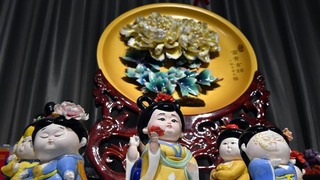The Third Age of Luoyang
Zhou dynasty ca 1046-475 BCE
Western Zhou ca 1046-771 BCE
Eastern Zhou ca 770-475 BCE
The final pre-imperial dynasty was the Zhou, originally a dependent state to the Shang dynasty. The dynasty is generally divided into the Western Zhou and Eastern Zhou, leading into the Spring and Autumn and Warring States periods. This tumultuous seven hundred years was caused by the Zhou's feudal administrative system whereby kin were appointed to administer territories. Eventually these lords grew strong enough to contest the Zhous authority, provoking them to move their capital from Hao ( modern Xian) to their well protected eastern capital of Chengzhou way from their traditional base in the Wei Valley. This marked the beginning the Eastern Zhou, when Luoyang became the primary capital, after 295 years serving as the eastern capital of the Western Zhou. The Eastern Zhou constructed a new capital called Wangcheng 15km west of Chengzhou. Wangcheng served as their capital from 771 BCE until 510 BCE when the seat of power reverted to Chengzhou. The Eastern Zhou capital was the largest of the dynastic era cities, covering an area of about 100sqkm, and remains of Wangcheng can be seen in the city's Wangcheng Park.
This was a time of near constant warfare. But it was also a culturally vibrant period when many of the seeds of Chinese culture were first sown, Confucius lived in this period. While the opposite, complimentary school of thought known as Daoism evolved under the Zhou. Though other competing philosophies also emerged from the chaos that was gulling the empire, two of the three pillars that would go on to support the imperial mandate for much of the following two millennia were erected during the Zhou period, provoking scholars to draw parallels with Ancient Greece.
After the Warring States period the capital moved from Luoyang to Xianyang (Xian) when the Qin proved to be the state ruthless enough to conquer all under heaven. Though his dynasty was short lived, the First Emperor Qin Shihuang's unifying ideals, his standardisation of everything from language to the width of axles, his appetite for major construction projects like the first Great Wall, his centralization of authority and his brutal suppression of dissent, would pave the way for the most enduring political system in human history. It perhaps seems prescient then that from “Qin” we have the word China.

